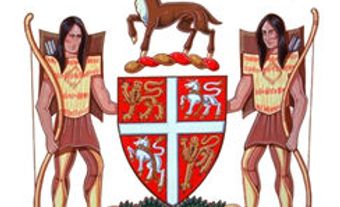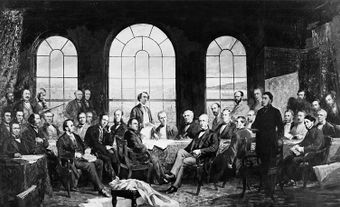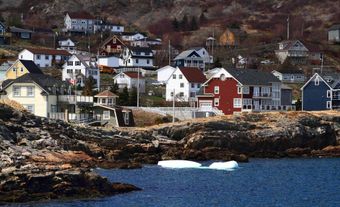Sir Ambrose Shea, diplomat, politician, businessman, newspaperman (born c. 1815 in St. John’s, Newfoundland; died 30 July 1905 in London, England). Sir Ambrose Shea was one of the most influential Newfoundland politicians of the 19th century. He served in the colony’s House of Assembly for 34 years, including six as Speaker. He was a key player in both Liberal and Conservative administrations, having crossed the floor twice. A skilled orator and diplomat, he was admired for his attempts to mend political divisions between Catholics and Protestants, and for his promotion of the island’s economic development. His enthusiastic support for Confederation following the Quebec Conference in 1864 hurt his career in Newfoundland, as Confederation did not gain popularity there until the mid-20th century. He is nevertheless considered a Father of Confederation. He also served as governor of the Bahamas.

Early Years
Ambrose Shea’s father, Henry Shea, was a successful merchant. He arrived in Newfoundland in the late 1700s. Henry went on to raise a family of three girls and six boys. One son spent his life in England. The other five children became prominent members of Newfoundland society. Two became physicians and two became publishers of the family-run newspaper, The Newfoundlander. The youngest, Edward, served alongside Ambrose in the House of Assembly for many years.
Early Career
At the time of Shea’s birth in St. John’s in 1815, Newfoundland was a fledgling colony of some 40,000 inhabitants. That number more than doubled by the time Shea was first elected to the Assembly in 1848. But the island remained overlooked in the British Empire. With little arable land or heavy industry, Newfoundland was dependent upon the export of fish and the import of manufactured goods. Within this context, Shea was dedicated to expanding and diversifying Newfoundland’s economy through colonial trade networks. He pushed for the establishment of regular steamship routes to Halifax and Montreal, and for the construction of a railway across the island. Shea was regarded as an asset to the government in these projects. Eloquent and diplomatic, he made strong connections in St. John’s by selling and chartering ships during his early career. He was well positioned to negotiate with private capitalists on behalf of the government.
Shea was first elected to represent the district of Placentia-St. Mary’s as a member of the Liberal Party. The two central planks of the Liberal platform were the establishment of free trade with the United States and a system of responsible government. Shea played an active role in realizing both aims. In 1853, he travelled to Washington, DC, to negotiate Newfoundland’s inclusion in the Reciprocity Treaty between Canada and the United States. This was the first of several diplomatic missions he made on behalf of the colony.
Not everything went so smoothly, however. As a leading member of the Liberal caucus, Shea’s campaign for responsible government brought him into direct conflict with the governors of the colony — first with John Gaspard Le Marchant and then with Ker Baillie-Hamilton — who refused to subordinate their office to the House of Assembly. After nearly seven years of public sparring, responsible government was granted by the Colonial Office. It was inaugurated with the election of 1855, in which Shea was re-elected and the Liberals retained their commanding majority.
Speaker of the House of Assembly
For the next six years, Shea served as Speaker of the House of Assembly. This position focused on the more technical aspects of government and policy. It initially removed him from public controversies. But in July 1858, the premiership was taken over by John Kent, a pro-clerical leader whose politics were at odds with Shea’s belief that religious sectarianism had no place in government. Before long, the Liberals were severely weakened by internal bickering between Shea, Kent and the attorney general. Shea threatened to resign as Speaker. He in turn was called out by the editors of The Public Ledger, a rival paper to The Newfoundlander, for his “audacity to attempt a control of Government by resigning his position.” The Liberals narrowly lost the election of 1861 to the Conservatives. Shea found himself seated in the opposition.
Confederation
Newfoundland was invited to attend the Quebec Conference in the fall of 1864. The administration sent two delegates: Ambrose Shea, to represent Liberal-Catholics; and the Assembly’s new speaker, Frederic Carter, to represent Protestant-Conservatives. Both became enthusiastic supporters of Confederation. But both men had difficulty convincing their colleagues and constituents of its benefits. The island had won relative autonomy a decade earlier when it gained responsible government; many people felt that its interests would be compromised by a remote and indifferent government outside the colony.
The following year, Carter became premier. Shea — along with his brother Edward and John Kent — crossed the floor to join the executive of the new government. By 1869, party lines had been completely redrawn between pro-Confederation candidates, led by Carter and Shea, and the anti-Confederation party, led by Charles James Fox Bennett. Shea’s team lost badly. For the first time, he lost his own seat.
(See also: “The Anti-Confederation Song”; Newfoundland and Labrador and Confederation.)
Later Life and Career
Ambrose Shea contested the seat for St. John’s East as a Conservative in 1873, but lost again. However, another election came only a year later. This time he contested the seat for the town of Harbour Grace, which he won. For the subsequent decade he spent in the Assembly — working once again under Frederic Carter’s premiership, then under William Whiteway’s — he continued to push for the expansion of trade by way of steamship cargo, as well as what would become the Newfoundland Railway Company. (See also Railway History.)
By far the most trying incident of these years came in 1883. Religious tensions in Shea’s constituency of Harbour Grace boiled over, resulting in a riot that killed three Orangemen and one Catholic. Nineteen Catholics were brought to trial in the aftermath. They were soon acquitted by the Supreme Court of Newfoundland. However, Whiteway’s caucus moved to officially condemn their acquittal in an amendment to the 1885 Speech from the Throne. Shea and others saw the move as brazenly anti-Catholic. The debacle set Shea at odds with the Conservative caucus. In the election of 1885, he once again crossed the floor, winning St. John’s East for the Liberals.
In September of that year, the Governor of Newfoundland, John Hawley Glover, died. Shea, then 70 years old, began petitioning for his appointment to the office. He travelled to London, England, to make his case at the Colonial Office, where he was well received. Carter was also in the running, but Shea, with his diplomatic experience and commercial expertise, seemed like the obvious choice. However, Shea’s opponents in Newfoundland, including Whiteway, lobbied to prevent his appointment. In 1886, the title was given to Sir George William Des Vœux, a colonial official with no prior connection to Newfoundland. Shea returned to St. John’s, frustrated by what he saw as Orange Order prejudice.
Governor of the Bahamas
A year later, however, the Colonial Office granted Shea governorship of the Bahamas. He and his wife, Louisa, arrived in Nassau in October 1887. They remained there for seven years. In that time, Shea worked to develop the archipelago’s networks of transportation and communication — in particular telegraph and steamship routes. He also oversaw the construction of a new hospital and tried to help poor rural communities by promoting the cultivation of sisal (a species of Agave).
In 1895, he and Louisa retired to London, England. Shea died there on 30 July 1905, at the age of 90. His body was returned to St. John’s, where he was given a state funeral.
Legacy
Sir Ambrose Shea was one of the most influential Newfoundland politicians of the 19th century. He served in the colony’s House of Assembly for 34 years. Though never elected premier or appointed governor, he was a key player in both Liberal and Conservative administrations. A skilled orator and diplomat, he was universally admired for his persistent attempts to mend political divisions between Catholics and Protestants, and for his promotion of the island’s economic development. The Sir Ambrose Shea Bridge in Placentia is named in his honour.
Shea also confronted serious political obstacles. As a moderate Catholic with close connections to London, he was never well positioned to lead the Liberal Party, which throughout his career possessed a strong clerical and Irish-nationalist streak. As a Catholic, he was never fully at home in the predominantly Protestant Conservative Party. Even more detrimental to his career was his enthusiastic support for Confederation. It did not gain widespread popularity in Newfoundland until the mid-20th century. He is nevertheless considered a Father of Confederation.
See also: Fathers of Confederation: Table; Fathers of Confederation: Collection; Editorial: How the Canadianized Community of Newfoundland Joined Confederation; Newfoundland and Labrador Timeline.

 Share on Facebook
Share on Facebook Share on X
Share on X Share by Email
Share by Email Share on Google Classroom
Share on Google Classroom


